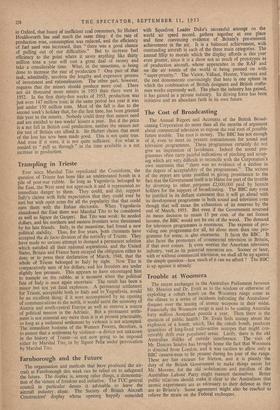The Cost of Broadcasting
The Annual Report and Accounts of the British Broad- casting Corporation do more than all the months of argument about commercial television to expose the real root of possible future trouble. The root is money. The BBC has not enough of it, even to meet its present commitments for sound and television programmes. These programmes certainly do not give an impression of lavishness. Indeed the sound pro- grammes often carry painful indications of pinching and scrap- ing which are very difficult to reconcile with the Corporation's own statement that " there was no evidence of a decline in the degree of acceptability of the programmes." The writers of the report are quite justified in giving prominence to the fact that the Government itself is to blame for part of the trouble by diverting to other, purposes £2,000,000 paid by licence holders for the support of broadcasting. The BBC may even be justified in its defiant statement that it will go ahead with its development programme in both sound and television even though that will mean the exhaustion of its reserves by the end of March, 1955. But even if the Government reversed its mean decision to retain 15 per cent. of the net licence income, the BBC would not be out of the wood. The demand for television programmes is enormous. The expense of pro- viding one programme. for all, let alone more than one pro- gramme for some, is also enormous. It faces the BBC. It also faces the promoters of commercial television in Britain, if that ever comes. It even worries the American television industry, vast as its potential resources are. Sooner or later, with or without commercial television, we shall all be up against the simple question—how much of it can we afford ? The BBC is up against it already.


































 Previous page
Previous page